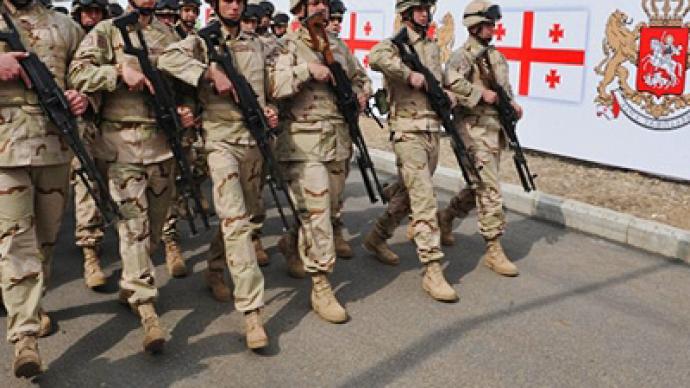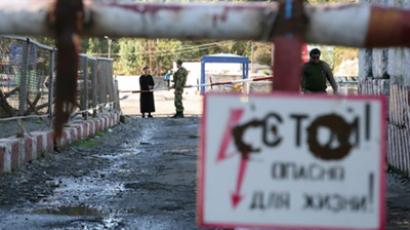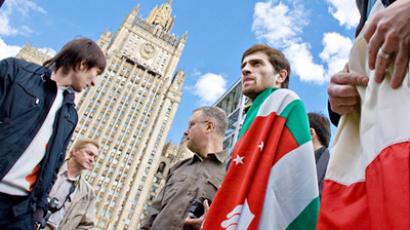Georgia has no chance of joining NATO – opposition leader

Georgian opposition leader Nino Burdzhanadze explains why she thinks her country will not be accepted into NATO. She voices ways to improve Russia-Georgia relations and comments on the state of democracy, in an exclusive interview with RT.
RT:Thank you for your time. Often when addressing rallies you say your mission is to introduce democracy to Georgia, to make it more democratic, but this conflicts with the image of your country in the West where Georgia is often presented as a beacon of democracy.What don't you like about the current version of Georgian democracy?Nino Burdzhanadze: The myth of Georgia as a democratic country really exists to a certain extent, but it is based on the fact that soon after the Rose Revolution we really began to bring about serious democratic reforms – we reformed the bureaucratic apparatus, passed many laws supposed to bring the country on a democratic beeline. However, unfortunately, even when I was in power, I was talking about the problems that existed then, including independence of judicial power and of the media, notions that were already gaining momentum. There was also concern about the issue of decision making, when more often than not decisions were taken by a certain circle of people. By 2007, and in January 2008, when President Saakashvili was re-elected for the second term, there had been a chance that the Saakashvili government and the team would realize the problems and mistakes they had made and would try to fix them. Regrettably though I could see that all the promises they had given about reinforcing democracy were implemented, just in a contrary way. I saw the country go towards a bigger monopoly of power, more control over the media – which I don’t like, including Constitutional changes – the situation with business and administration of justice – all that does not infer a democratic state.RT:You’ve been in opposition for several years. How strong is the Georgian opposition now, in your opinion?NB: It’s hard to be strong in a near-totalitarian state, when nearly the all business is under governmental control it’s next to impossible to find ways to finance political parties.When the media is under state control, it’s really hard to have my voice heard and convey my arguments to the people. When there is no administration of justice, it’s very hard to protect oneself from slander constantly being dished out, poured not only from the government but also from the media under their control. Nevertheless, I believe the active steps that are manifested from time to time are a sign that the opposition keeps on struggling.RT:Refugees who are not few in Georgia often complain about repressive measures by the authorities. At the same time, Tbilisi regularly passes laws proclaiming equality, tolerance, common rights. Isn’t there a contradiction, in your view?NB: It’s not a matter of laws or tolerance. The question is that perhaps the biggest mistake or even crime of Saakashvili is that he divided the whole of Georgian society into two parts – “ours” and “aliens” – this is the most horrible thing. He even managed to divide the refugees into “his own” who turned – due to his absolutely inappropriate policy –into refugees for the second or even the third time, and those from the Shevardnadze period – those who had been expelled from Abkhazia in their time. Those who became refugees after the August 2008 events [the war in South Ossetia], they succeeded to find some money to build what can’t be described as anything other than a ghetto, because it is impossible to say this is a place normally suitable for living. And the refugees who had appeared before Saakashvili’s rule are simply evicted and left homeless.RT:To change the topic slightly, how would you describe current relations between our two states, Russia and Georgia?NB: Could not be worse, I guess. It could have been worse only during the August [2008] events – during the war – indeed it was a tragic phase and tragic days, not only for Georgia, I think. Today, relations between Russia and Georgia can be described as very bad and far from normal. I think this situation will hardly change for the better as long as President Saakashvili is in power for a simple reason: in the West’s view he has been trying to prove his indispensability through fighting against Russia. On the one hand he says, yes it is necessary to have a dialogue with Russia, but on the other hand his steps and even statements invalidate any normal or politically correct proposals. I am absolutely certain that Russia-Georgia relations should become normal, but that will be possible only when both Russia and Georgia have respect for lawful – let me repeat this – LAWFUL interests of each other, and when relations are based on implementing the agreements that will have been achieved then.RT:If you could list some priorities, what would you mention that both Russia and Georgia could do to normalize the relationship?NB: It’s really hard to speak about this, because after the August events one can’t but feel the relationship is in a stalemate. For Georgia, no matter who rules, be it more or less a normal person, the question of Abkhazia and the so-called South Ossetia, will be most concerning. In order to start resolving the issues, Georgia and its leadership should repair the bridges with Abkhazians and South-Ossetians that were burned and restore, step-by-step, the dialogue with the Russian Federation – it’s crystal clear. But so as to have this dialogue, on the other hand, one can’t make steps that would be constant irritants in Russia-Georgia relations, in a tit-for-tat manner – that will yield nothing good.RT:You have partially responded, but I would just like to make it more distinct: How should Georgia build its relations with those republics, territories? What must be there as a starting point in the relations?NB:Back two years ago, when our party held a congress, I said, among other things, that first and foremost we must return the Abkhazians and [South-]Ossetians into a unified Georgian state, and only through returning the residents should we speak about returning the territories.Territory matters but it is not primary. We must first find a common language with those people. For centuries we have been living side by side – we have a longer tradition of common living and building a common state than those events in the recent past that tragically happened. Sure, it won’t be easy, and it will take time, but let me tell this straight, Russia will surely be able to play a huge and very positive role in this. Should this role be really positive in this respect, Russia-Georgia relations will rise to an entirely new, positive level.RT: We have mentioned the war, and before August 2008 Russia had often expressed concern over the growing military power of Georgia. What is going on now? Is Georgia stepping up its military potential, by re-equipping its army?NB: Not any more, just because there are currently no supplies or deliveries of armaments from our Western allies. I believe it should not be a priority for Georgia to step up its armed forces. As an independent state, Georgia surely must have its armed forces, but they should conform to the standards Georgia needs as a priority: peaceful development of the country and an ability to defend itself and its interests. By no means either Abkhazians or Ossetians should feel that what transpired in the tragic days of August should never occur again. They should be aware and be sure, not through mere words but indeed, that Georgia would never use force against its own citizens – Abkhazians and Ossetians, and no matter how complicated that might be, will negotiate not in the language of weapons but diplomacy and based on finding a common language.RT: Before the war, many had an impression Georgia had been the “darling of the West” – it seemed to many in the Soviet Union that Georgia had more chances for transformation, including of democracy, because the West was assisting not only morally but materially. Do you think that now that two years have passed since then, Georgia has lost its unequivocal support from Western powers – I mean benevolence and readiness to support some programs in Georgia?NB: Georgia was kind of a favorite. One must say that after the Revolution, both our government and myself felt proud, because we enjoyed the support of the majority of the country, and the West was loyal to us. As a matter of fact, during the initial period, Russia had a sort of a let’s-wait-and-see stance, although positive. Unfortunately, I have to say, my main complaint against Saakashvili is that he destroyed all that – the domestic support that used to be so high and the support from the West as well. Well, the West does back us now, but it goes beyond comparison with what we had enjoyed before the war. The support from the West began to dwindle even before the war because the West saw clearly the democratic reforms were not as quick and right as expected. I remember very well how dubious Germany was about the legal system in Georgia. And the war surely destroyed Georgia’s reputation.RT:I would like to hear your stance on NATO as Georgia was invited to join it several years ago. What do you think it will bring, and take from Georgia?NB: Let’s proceed from reality. Georgia has now no chance of being a member of NATO. As a politician I am experienced enough to understand what is meant when very good and pleasant phrases are said, that the NATO door is open for Georgia. Indeed, they are open, but it’s not clear when these open doors will be open enough for Georgia to use this opportunity. The main complaint against Saakashvili is that he not only lost 20 % of the territory and cracked down on all the democratic institutions, but he also did many things that made it practically impossible, including membership of NATO.RT:We have mentioned the recent war – of 2008 – I also know that today you attended a ceremony opening a memorial to another war – why did you decide you had to attend?NB: It’s because this war for me, same as for millions of people not only in the countries of the former Soviet Union, but also all over the world – is sacred. So, now, to destroy a monument is absolute sacrilege. Some members of my family died in that war. And the brother of my grandmother, still alive, fought in the war – for those people it was so painful and insulting. What is most amazing is the reason was not clear.RT:Do you think Russia was sincere in its wish to partially recreate that memorial?NB: I think, yes – because for Russians and especially for the generation of Russians who are now in power, the Great Patriotic War is a sacred thing. I believe it was a sincere wish to show all the Georgian people that the attitude [to the memory of the war] is different to their leadership. I do hope that I don’t make any mistake when I hear the words of very highly-ranked officials in Russia, including the prime minister, about the wish that a totally different [regime] is built in Georgia, built on respect to the interests, good neighborliness and equality, which has been again emphasized.














